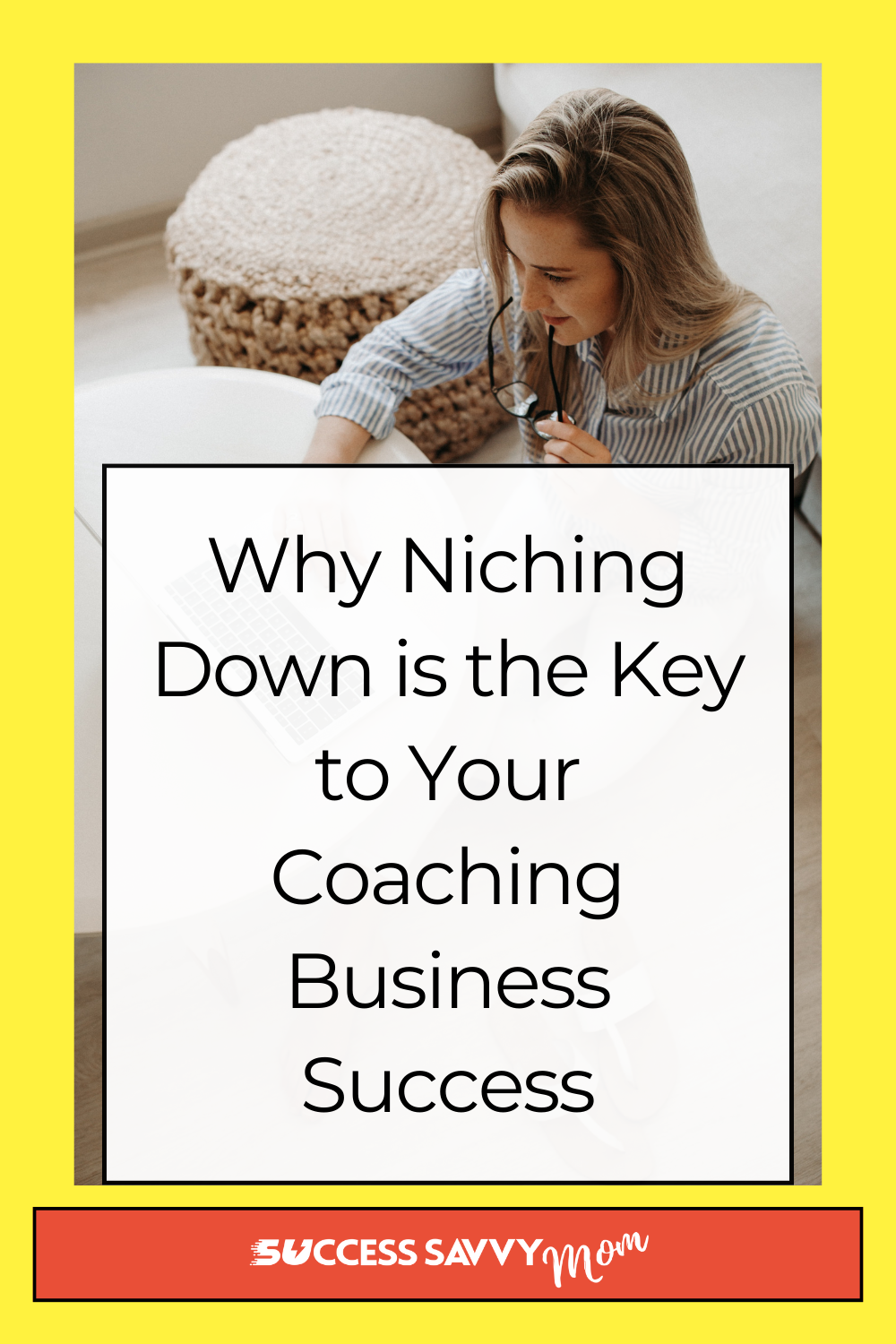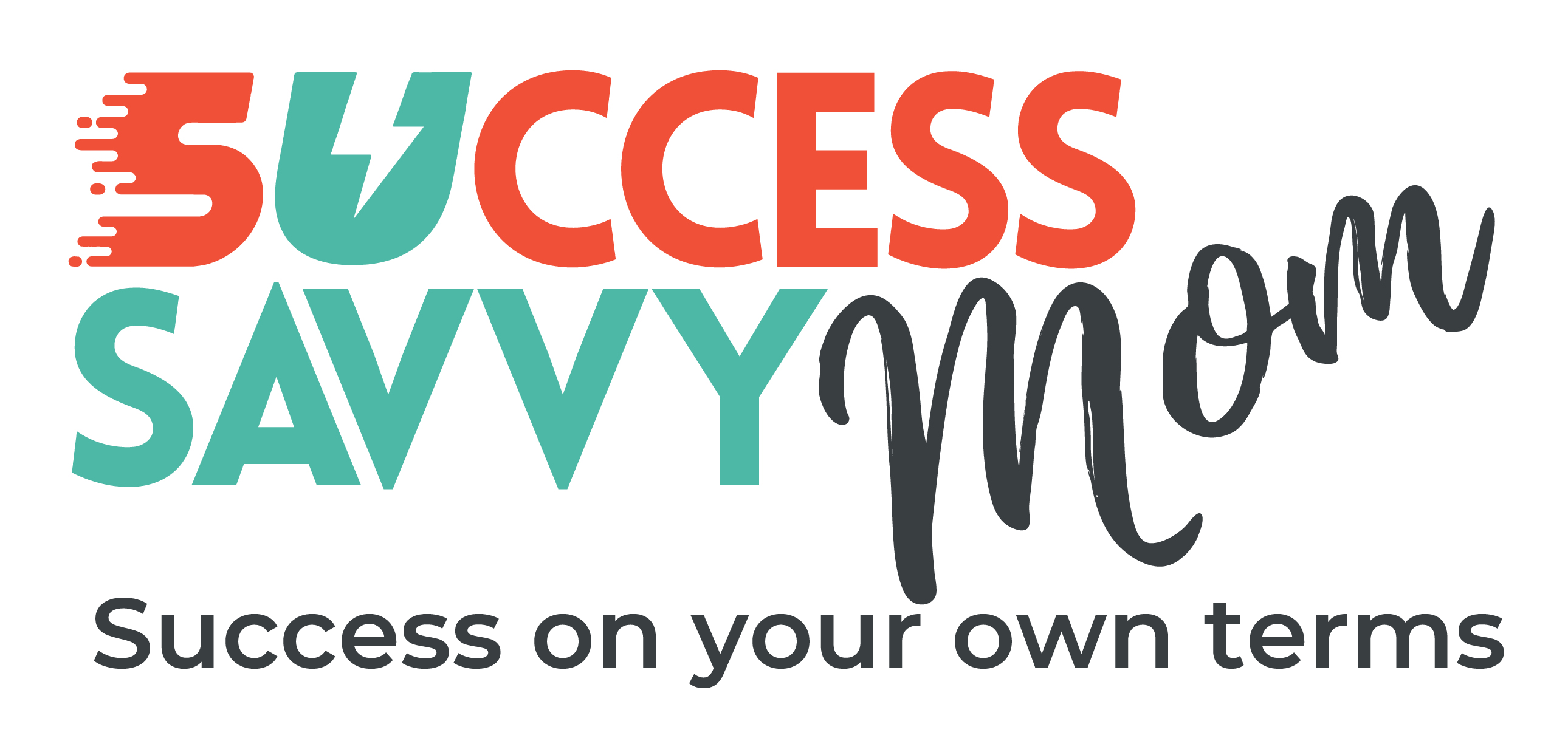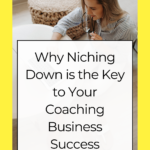
Table of contents:
Here’s what I’ll cover in this article:
- You’re an Expert in Your Niche
- You Stand Out From Your Competition
- You Attract Clients Who Are a Better Fit
- You Can Charge More For Your Services
- You Get Better Faster
As a business owner, I’m sure you’ve heard the phrase “niching down” before – even if only by me! I know that I talk about it a lot, for the simple reason that I believe it’s crucial to the success of any business.
So what is niching down? Simply put, it refers to the practice of focusing on a specific “niche” – or target market – for your products or services, rather than trying to appeal to everyone.
And this is exactly why many (…most…) people have a strong knee-jerk reaction to niching down. They strongly resist it because there’s this idea that if you niche down, you’ll be losing out on potential clients.
If you want a business, then logic dictates that more potential clients means more income and more success, right?
Well, no.
Though it’s very counterintuitive for many, niching down will actually lead to more clients and greater success for your business.
Here are just a few of the reasons why:
1 – YOU’RE AN EXPERT IN YOUR NICHE
When you niche down, meaning you focus on a very specific sub-market, you also begin to focus very specifically on their needs, wants, fears, dreams, problems etc, instead of those of the market at large, which needless to say are pretty much infinite.
The advantage of focusing on this very specific audience is that in time, you begin to know them very intimately – kind of like when you’re dating, you become an expert in your significant other instead of men (or women) at large.
This means that you know the exact problems that they’re struggling with right now. You know how that feels for them, why they’re struggling with them, and what’s keeping them from getting out of that situation.
This in turn means that you understand the solution to that problem. You understand what steps they need to take to make the first bit of progress, and what they need to do from there.
You understand how to motivate them, how to keep them focused and moving in the right direction, even when the going gets tough.
You begin to understand them just as well you you understand your significant other – and this is where the magic happens.
When a client comes to you with something they’re struggling with, you know what needs to be done, because chances are you’ve had a client that’s struggled with that very same issue before.
This means not only that you’re actually going to be helping your clients achieve the goals they set out to, but that you’ll get them there much faster because the run-of-the-mill coach will have a run-of-the-mill approach, where yours will be based on experience of what you know to work.
It always pays to have more specialized knowledge than just general knowledge!

2 – YOU STAND OUT FROM YOUR COMPETITION
This is another point that’s often lost on new coaches when they’re first starting out.
Coaching is an extremely competitive business for multiple reasons, such as a low barrier to entry and no regulations over who can call themselves a coach and who can’t.
Now, this is obviously an advantage for coaches because it means that they can enter the market easily, but it’s also an obvious disadvantage because it means that everyone else is entering the market too.
But here’s the good news: if you know how to set yourself apart from the competition, then the fact that the market is over-saturated is great, because all your competition is in one bucket, while you’re in your own, separate jacuzzi.
So, how does niching down mean that you’re setting yourself apart from your competition?
Well, look at it like this:
As I just stated, most new coaches are very afraid to niche down far enough that it can actually be considered a niche, and not just a demographic.
This means that simply by defining your audience better than your competition, you’ve got the edge, because it stands to reason that if you know your audience better, you know their needs as well as everything else better.
This in turn means that you’ll know how to speak to them better. You’ll know what they’re worrying about, so you’ll be able to create a post about that. You’ll know what they’re feeling stuck on, so you can create a video tutorial that helps them with that problem.
The better you can communicate clearly with your audience, the better quality bond you’ll create, and the more trust you’ll build.
If, on the other hand, you try to appeal to a broader audience, you won’t know what specifically their problems are, because their problems, just like the audience, is too broad.
So because your competition is trying to appeal to everyone while you’re only trying to appeal to a specific demographic, you stand out almost by default.
I hope that makes sense!
3 – YOU ATTRACT CLIENTS WHO ARE A BETTER FIT
This one should be evident if you’ve read the 2 former points, but just for the sake of being thorough, let’s spell it out here.
If you know your audience like the back of you hand (which you should if you’ve niched down enough), then you’ll know pretty much everything about them.
You’ll know what keeps them up at night and you’ll know what dreams they’ve got that they don’t want to admit to anyone. You’ll understand things about them that they probably can’t really articulate themselves.
All of this knowledge is what helps you create content – you create blog posts, videos, podcast episodes, social media posts etc about these things.
You show them that you understand them deeply, that you know what they’re going through.
Because you’re being so specific in the content that you’re creating and the problem you’re solving, it’s only going to appeal to people who are very specifically going through that.
But it’s going to appeal to them in a major way, because it’s almost going to feel to them like you can read their minds, which creates a trust factor that’s impossible to replicate if you don’t have this knowledge.
This means that not only are the people who resonate with your content automatically your ideal clients, it also means that they’re going to be far more likely to convert to paying clients at some point because they trust you.

4 – YOU CAN CHARGE MORE FOR YOUR SERVICES
Ok, so I’m sure some of you saw and this and thought “wow, all of you coaches are the same, all they think about is money! I don’t want to be like that – I’m not in it for the money so I couldn’t care less about this point”
Ok, so there’s a ton of things to say to someone who thinks this, but I won’t get into it here.
I will state a couple of important things though, as I do think that it’s important to state some of this upfront.
First, if you’re here, then I assume that you have already, or would like to start a coaching business. Well, if you don’t charge people, then you’re not in business, you’ve just got a hobby.
Next, there’s a lot to be said about the psychology of having people pay. To illustrate this – how many free ebooks do have have laying around on your hard drive that you’ve never bothered to read, further than a cursory look when you first downloaded it?
But how many books that you’ve paid for are laying around, never opened?
If you’re like most people, I’m sure that the numbers are heavily in favor of: lots, to almost none, respectively.
My point is that people don’t value what’s free (or has little perceived value), so if they don’t pay for it, they won’t take action that they need to in order to make the changes that they’re paying you for.
Ok, like I said, there’s a lot more to say, but I’ll leave it here for this article 🙂
Let’s get into why you can charge more when you’re an expert:
Well, this is again pretty obvious.
If you’ve spent years working on a very specific issue, you get incredibly good at solving it. It’s going to be increasingly easier to find people who are going to be willing to pay more for your expertise and for delivering exceptional results in record time.
This isn’t some way to “rip off” your clients in any way – you’ve spent years (and likely thousands) honing your skills, developing your expertise and improving your knowledge.
Your knowledge is what’s going to be shaving off years of their own trial and error before getting the results, and this is what they’re paying for.
I’m going to be a little blunt here, but if you’ve got issues with asking to be paid what you’re worth, it’s going to be really hard for you to make a living as a coach 🙂
5 – YOU GET BETTER FASTER
If you’re constantly working on one specific skill, one specific problem, and one specific solution, it goes without saying that you’re going to improve on it much faster than if you’re trying to improve on 10 different things at the same time.
The faster you get better, the faster you can start taking on more clients and charging them more, the faster you get to your income goals, or however it is that you’re measuring your success!

I hope that this article helped you see the advantages of niching down, and maybe even get over the fear of niching down in your own coaching business and how not doing so might be hurting more than you thought.
So what are your own thoughts on the subject? Do you think you’ve niched down enough, or did you stop at a comfortable demographic because you’re afraid of being too narrow?
Let me know in the comments, I’d love to hear!
Hope to talk soon, and in the meantime, take care!
Jen
P.S. Don’t forget to pin this for later!



